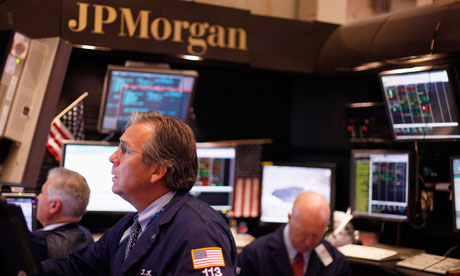London Whale scandal to cost JP Morgan $920m in penalties
US's biggest bank to pay penalties to US and UK regulators for 'unsound practices' relating to $6.2bn losses last year

JP Morgan's admission of wrongdoing is a major victory for the US securities and exchange commission. Photograph: Lucas Jackson/Reuters
JP Morgan has agreed to pay about $920m in penalties to US and UK regulators over the "unsafe and unsound practices" that led to its $6.2bn London Whale losses last year.
The US's biggest bank will pay $300m to the US office of the comptroller of the currency, $200m to Federal Reserve, $200m to the securities and exchange commission (SEC) and £137.6m ($219.74m) to the UK's financial conduct authority.
JP Morgan admitted wrongdoing as part of the settlement, an unusual step for a finance firm in the crosshairs of multiple legal actions.
"JP Morgan failed to keep watch over its traders as they overvalued a very complex portfolio to hide massive losses," co-director of the SEC's division of enforcement, George Canellos, said.
"While grappling with how to fix its internal control breakdowns, JP Morgan's senior management broke a cardinal rule of corporate governance and deprived its board of critical information it needed to fully assess the company's problems and determine whether accurate and reliable information was being disclosed to investors and regulators."
In a statement the OCC blamed "unsafe and unsound practices related to derivatives trading activities conducted on behalf of the bank by the chief investment office (CIO)", for the fine.
The OCC said its inquiries had found inadequate oversight and governance to protect the bank from material risk, inadequate risk management, inadequate control over pricing of trades, inadequate development and implementation of models used by the bank, and inadequate internal audit processes.
The US authorities are still pursuing JP Morgan. The Justice Department is pursuing criminal charges against some of the bankers responsible for the massive loss. In an indictment unsealed in federal court this week Javier Martin-Artajo, who oversaw trading strategy at the bank's London office, and Julien Grout, a trader who worked for him, were charged with securities fraud, conspiracy, filing false books and records, wire fraud and making false filings to the SEC.
Grout's lawyer said this week that his client was being "unjustly played as a pawn in the government's attempt to settle its highly politicized case against JP Morgan Chase".
The bank also faces another fine from the commodity futures trading commission which is still investigating whether the bank is guilty of market manipulation.
Jamie Dimon, the bank's chairman and chief executive, initially dismissed the mounting losses at the bank's London offices as a "tempest in a teapot". In a statement Dimon said: "We have accepted responsibility and acknowledged our mistakes from the start, and we have learned from them and worked to fix them. Since these losses occurred, we have made numerous changes that have made us a stronger, smarter, better company."
This week in a letter to staff he warned: "Unfortunately, we are all well aware of the news around the legal and regulatory issues facing our company, and in the coming weeks and months we need to be braced for more to come."
The admission of wrongdoing is a major victory for the SEC. US judges in recent years have questioned fines where banks were allowed to neither admit nor deny wrongdoing. Judge Jed Rakoff blocked a 2011 SEC settlement with Citigroup because he said the lack of an admission of wrongdoing made it impossible for him to determine whether the fine was "fair, reasonable, adequate and in the public interest".
John Coffee, Adolf A Berle professor of law at Columbia Law School, described the fine as "somewhat less than satisfactory".
"The victims of this enormous loss were the shareholders of JP Morgan and the remedy is for those shareholders to pay $900m-plus in fines. It's not just adding insult to injury, it's adding injury to injury.
He said no senior bank official had been charged with wrongdoing and described the those indicted so far as "relatively small fish".
"Ideally the regulators should fine actual individuals who are responsible. But time and again the SEC settles for large penalties and gives virtual immunity to some officers."
No comments:
Post a Comment